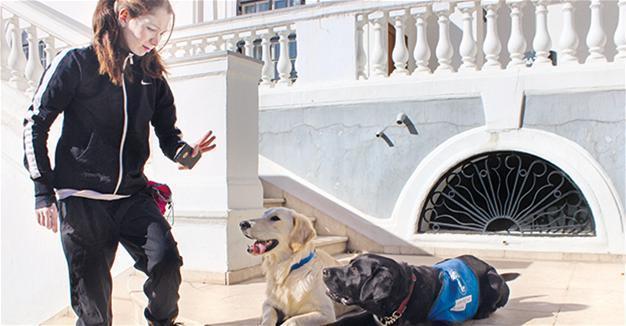Turkey’s first professional guide dog hits the streets
Barçın Yinanç - ISTANBUL
 When David Adams came to Turkey late last month, he went to visit the grand bazaar and the spice market, two of Istanbul’s main tourist attractions.
When David Adams came to Turkey late last month, he went to visit the grand bazaar and the spice market, two of Istanbul’s main tourist attractions.But security at the door stopped him, saying he couldn’t enter. The visually impaired Adams, who is also the president of the European Guide Dog Federation, was accompanied by his guide dog, Zoey, which was not allowed to enter the market.
Because Adams and his wife were accompanied by a member of Turkey’s Guide Dog Federation, they were eventually able to enter in the company of Zoey, but only after 15 minutes of persuasion.
Adams came to Turkey to celebrate Kara (“black” in Turkish), Turkey’s first professional guide dog’s first days of work. Her job definition? To be the eyes and best friend of Nurdeniz Tuncer, the founder and president of Turkey’s Guide Dog Association.
Even a ball was organized on Nov. 26 for Kara’s job inauguration (and to raise funds as well), putting her under the spotlight. But she could hardly beat the popularity of Turkey’s first celebrity guide dog, Star (Yıldız in Turkish), or as the Moore couple call her, “Yıldız Hanım.”
“Star has changed my life,” said Maggie Moore, the visually impaired wife of Richard Moore, United Kingdom’s envoy to Ankara. “It is like taking a fast train,” she said, addressing the crowd at the ball in Marriott Hotel in Şişli, recalling an anecdote about a visually impaired person’s experience of using a guide dog. While it used to take him 20 minutes to go to buy his newspaper, the time went down to five minutes when he started to be accompanied by a guide dog.
Moore found the opportunity to change others’ life when she met Tuncer in Ankara. Tuncer had lost 90 percent of her vision by the age of 10. By 30, what was left of her vision was getting weaker, but that did not stop her from pursuing a career in law.
It was on a program on CNN Türk that she found out about Maggie Moore and Star. As a lawyer with many clients in the United Kingdom and a member of the British Chamber of Commerce, it did not take her long to meet Maggie Moore, just as it did not take too long for the two to found Turkey’s Guide Dog Federation in 2014. They then found the sponsors, a Labrador puppy with the right genetic background and a candidate to be an instructor. Ece Önderoğlu, a young woman whose family name means son of a leader in Turkish, is now assuming a leadership role, becoming Turkey’s first guide dog instructor.
Önderoğlu was sent to the U.K. to spend 11 weeks with Alan Brooks to get the necessary training to be a guide dog mobility instructor. Brooks began work in 1967 with the Guide Dog for the Blind Association and says he has personally trained over 200 dogs – double that number through the supervision of trainees.
Brooks came to Turkey last month to assist Önderoğlu’s first experience as an instructor to see Kara and her potential lifelong owner, Tuncer. So far so good. Önderoğlu got her certificate last week and is set to start training five more puppies.
There are 750,000 visually impaired people in Turkey, with life for many of them less than easy given that the country is not exactly blind-friendly. “I have met the angriest blind people in Turkey,” Peter White, who has been BBC’s Disability Affairs Correspondent since 1995, told me. Blind since birth, White has been involved with the BBC since 1971 and is the first totally blind person to introduce reports for television news. “He was angry because he was saying that people were not considerate at all to blind people in the streets,” said White, who also came to Turkey as a guest of the association.
White also shared another anecdote he recalled from his interviews in Istanbul. “He told me he would differentiate between neighborhoods by the smell of their bins!”
The journey to have more people without sight in the streets accompanied by guide dogs will prove particularly difficult in Turkey. “There is too much unfinished construction and unregulated pavements,” said Brooks. Indeed sidewalks in big cities like Istanbul are even hazardous for people with perfect sight.
“And motorists should be more considerate too; so we need a lot of publicity,” added Brooks.
Part of the publicity in the press, thanks to the balls that were organized with the generosity of Marriott, has already made Kara famous, according to Tuncer.
Kara, however, is not in need of any attention, as guide dogs should not be distracted with pats to the head and other activity. What is needed is awareness as well support to have more trainers and, above all, full access for guide dogs.
The opposition Republican People’s Party (CHP) is preparing to bring a law to parliament that will secure easy access to guide dogs, Ali İlhan, the visually impaired advisor to the party’s deputy chairman, Veli Ağbaba, told me. İlhan is one of the candidates to be the next person in the street with a guide dog, which Önderoğlu will start training soon.
Training a dozen dogs each year does seem to be a modest beginning for thousands of people with visual impairments and thus limited mobility. But as Maggie Moore said, “Things have to start from somewhere.”
















